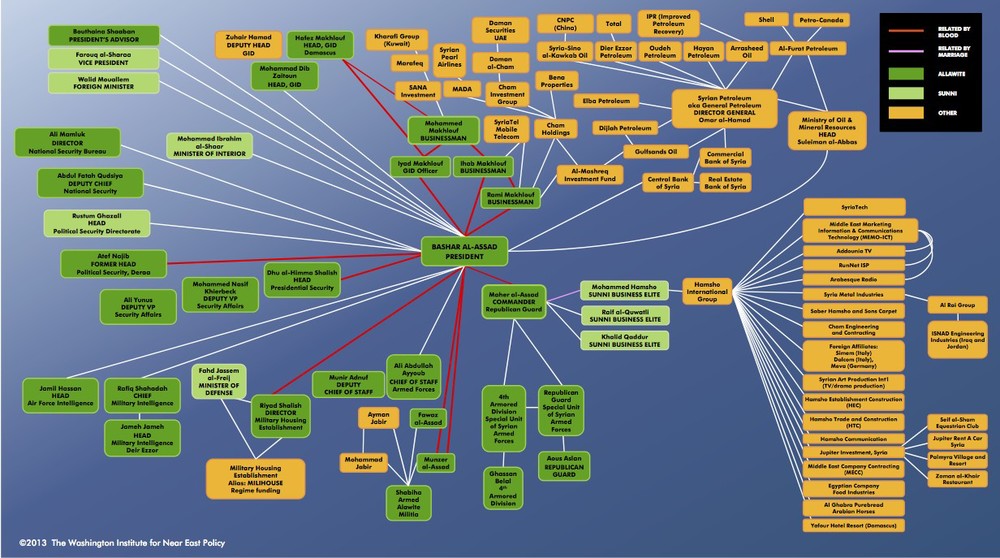Read it here
Tag: syria
Russia’s Favorite Syrian Warlord – The Atlantic
Sam Dagher.
Read it here
No Winners in Turkey’s New Offensive into Syria | Crisis Group
Interesting details on the fighting in Afrin by Noah Bonsey
Read it here
Russia Says Its Syria Bases Beat Back an Attack by 13 Drones
Read it here
« En Syrie, le viol était le maître mot »
Utterly devastating accounts of systematic rape in Assad’s jails
Read it here
Patrick Cockburn · Underground in Raqqa · LRB 19 October 2017
Read it here
Syrian regime chart

An interesting chart of Syrian regime figures and institutions, by WINEP.
The new normal in Damascus
Sarah Birke, reporting from Damascus for the NYRB blog:
While the brutal devastation caused by the Syrian conflict, now entering its third year, has affected many parts of the country, the Syrian government has long sought to portray the capital as an oasis of calm. Unlike Aleppo, parts of which have been destroyed by a year of battle, central Damascus shows few physical scars of war, apart from the many roadblocks and checkpoints, and the burned-out remains of a building northeast of the city that was bombed. Unlike Raqqa, a city in the east of Syria that is in the hands of extremist rebels, Damascus looks like a bastion of tolerant, vibrant life. In this view, the functioning city demonstrates both the continued strength of the regime and the dangers of the increasingly fractured opposition. But as my visit to the Umayyad Mosque revealed, under the surface things aren’t the same in the Syrian capital.
The same day, I went out for dinner with a well-connected businessman—he went to school with Bashar al-Assad and Bashar’s elder brother Bassel and has flourished under the regime, even more so since the crisis started. The restaurant served a take on continental food and any type of alcohol you might fancy. A coiffed young woman with a photo of Bashar as her iPhone cover sang songs as her smiling companions knocked back drinks at a price that would pay the rent of a displaced family for a month. At one point, the businessman got up to use the bathroom and something clattered to the floor. It was a pistol. “Oh, that,” he said. “I am so afraid of being kidnapped. I would rather kill myself than have that happen to me.”
Understanding the battle of Damascus
An illuminating explainer from Le Monde (in French) shows the dynamics of the confrontation between rebels and the regime in and around Damascus.
Carte animée : comprendre la bataille de Damas… by lemondefr
Mubarak will not go to Doha Arab summit
Update: Dina Ezzat suggests the Egypt-Qatar rift is about Sudan/Darfur as well as the Palestinians:
The summit, however, is unlikely to escape being the scene of squabbles over managing the reconciliation process between the Darfur leaders and Al-Bashir’s regime. While Qatar is determined to pursue earlier efforts to conclude a comprehensive peace deal on that front other Arab countries — especially Egypt — are determined to deny Doha control over the issue. As a result the summit may not issue a resolution with clear language on the Darfur-Khartoum reconciliation process.
The anticipated Egyptian-Qatari confrontation in Doha next week will not be confined to the management of the Darfur peace process. The diplomatic tug-of-war between the two countries that has continued for 12 months, especially over Palestinian reconciliation, is likely to cast a shadow across the Doha summit. With President Mubarak unlikely — so far — to attend, sending the foreign, or at best, prime minister, Qatar may not be so keen to avoid some squabbling over the text of resolutions to be adopted by the summit on the Palestinian issue. Sources say that Qatar has already suggested to several Arab countries that there is a need to break the “Egyptian monopoly” over Palestinian reconciliation. While this Qatari effort may not succeed — as some Qatari officials acknowledge — it would certainly impact on already tense Egyptian-Qatari relations.
Update II: AP has a write-up saying:
Hosni Mubarak’s decision, which came two days before the summit starts, already throws major doubts on its chances for success as the organization’s foreign ministers pleaded for unity in the face of threats against its members.